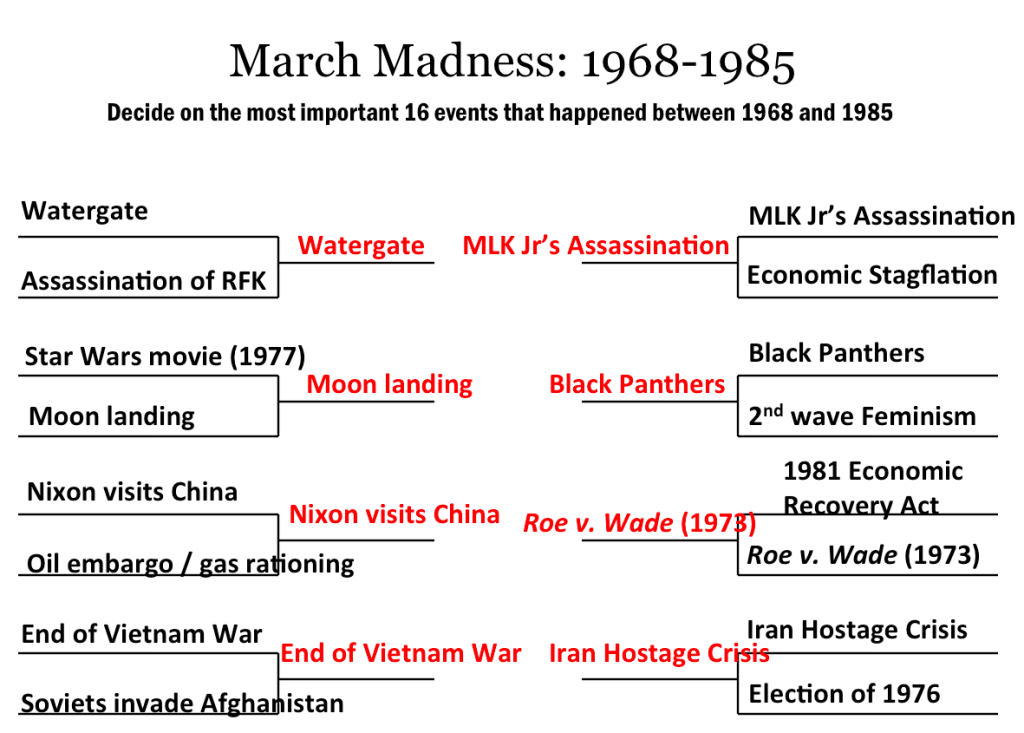This coming Friday 3/30 we have our second in-class exam, covering material from 1963 to 1980. The exam will be open book for the HOT book only. No notes, no Moss book.
In the HOT book, you’ll be responsible for these primary sources:
77 LBJ’s Great Society speech
113 Moody, Sit-in
117 Black Panthers
121 Soy Chicano
128 Indians of All Tribes
141 We Were Soldiers
149 SDS
151 Kerry
158 Clinton
162 McNamara
178 Weathermen
218 NOW
223 No More Miss America
226 Soy Chicana Primero
230 Schlafly
293 Carter’s Crisis of Confidence Speech
and these secondary sources (with brief summaries written by your classmates during Wed’s class):
103 Sitkoff, We Shall Overcome
Sitkoff says “King’s biggest victory was in Selma” (108) but riots in Watts and Chicago soon changed King’s goals to earning the lower class of blacks jobs and equality of opportunity, not just equality under the law.
166 Lind, Genuine Lessons of the Vietnam War
Lind argues (166) that the Vietnam War was not a huge mistake or a tragic error. He argues that both the siege and duel with Vietnam was necessary; not a context of the Cold War or a crime; it was simply a military defeat (169).
212 DeHart, Creation of a Feminist Consciousness
During the feminist movement in the late 1960s, there were two distinct groups, one seeking women’s rights (e.g. NOW) and the other supporting women’s liberation (e.g. Steinem, Ms Magazine, Sara Evans) (213).
263 Schrag, Forgotten American
“[The forgotten American] does all the right things, obeys the law, goes to church and insists – usually – that his kids get a better education than he did.” (264) They were not overly engaged in any of the movements, but did not necessarily disagree with what the movements were about.
273 McQuaid, Watergate
“The war made the United States look ineffective and divided, but Watergate made America look ridiculous in the eyes of its own people” “Washington looked as illegitimate and pathetic as it did misguided or criminal.” (274)
283 Farber, Taken Hostage
Americans were “taken hostage” in the 1970s by forces beyond their personal control: rising energy prices, cost of living increases combined with a new awareness of the actions taken outside of the nation by powerful agencies; this led to a feeling of helplessness politically and economically.
301 Carter, Politics of Anger
“George Wallace [an Alabama politician and 1968 presidential candidate] neared the limits of his political popularity, however, he opened the door for his successors to manipulate and exploit the politics of rage.” (315)
316 McGirr, Piety and Property
McGirr discusses the successes and failures of the Republican party and conservatism since the 1950s, as well as describes the conservative agendas (318, 327-328) and their responses to liberalism.
329 Dionne, Religious Right and New Republican Party
[Republicans of the Religious Right] believed the nation was losing moral values through the growing importance of politics and losing its connection to the Bible in politics. While in 1976 it was still possible for a “candidate with moderate—which is to say nonconservative—views on social issues to win the Republican nomination. By 1980, that had become virtually impossible.” (334)
During Monday’s class we clustered these documents into several topical areas and thought about exam questions that might help you demonstrate your knowledge about this time period, using these documents.
On Wed 3/28, we’ll talk about the rest of the 1970s and the election of 1980; the reading is 3 rather long essays about the profound social, cultural and political transitions of this era (Carter p. 301, McGirr p. 316, and Dionne p. 329). Read them selectively, i.e. read for argument, rather than for detailed content. If we had these three scholars sitting on a panel, where might they agree, and where might they disagree?

